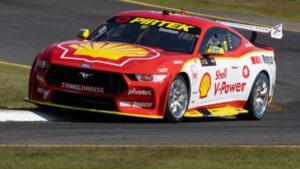Motorsport athletes navigate a distinctive realm that demands a blend of physical prowess and mental resilience. Central to their comprehensive training regimen, strength training is a cornerstone, addressing various aspects crucial for optimal performance on the track. This exploration delves into the multifaceted importance of strength training for motorsport athletes.
Where races often extend over significant durations, with constant demand placed on the body, a high level of muscular endurance is crucial. Muscular endurance training involves high repetitions, and sustained contractions to improve the ability to maintain control throughout a race. In this type of training, manipulating the work to rest ratio, heavily in favour of the working side, is an effective way to increase the demand of the workout, and drive strength endurance adaptations.
Trunk strength serves as an important link between stability and efficient power transfer in motorsport. This training targets midsection muscles, ensuring proper posture and controlled movements during acceleration, deceleration, turns on the track, and resilience to G-forces. In addition to anti-rotation exercises for stability, building resilience to G-forces entails targeted neck strength training which will assist in stabilising the head during high-speed manoeuvres.
Customization in strength training is pivotal for tailoring programs to the specific demands of different motorsport disciplines. Whether engaging in endurance racing, rally driving, or circuit racing, customization proves paramount. Strength training programs can be adapted to focus on attributes such as power, maximum strength, or endurance, aligning precisely with the requirements of each discipline. This approach guarantees that athletes are adequately prepared for the distinct physical demands associated with their chosen motorsport category.
The training approach for motorsport athletes often involves a strategic periodization plan those accounts for both the in-season and off-season. During the off-season, the emphasis lies on building a robust foundation, addressing weaknesses, and developing overall strength and endurance. Workouts are often more intense and varied to lay the groundwork for the challenges ahead.
As the in-season approaches, training shifts towards a more sport-specific focus, integrating exercises that mimic the movements and demands of actual racing. The intensity may be modulated to align with the demands of competition, ensuring that athletes peak at the right time. Maintenance of strength and endurance becomes crucial during the season, with a continued focus on injury prevention and recovery to withstand the physical toll of frequent races. Balancing the in-season and off-season training phases optimally contributes to sustained peak performance and longevity in motorsport.
In conclusion, strength training emerges as a linchpin in the preparation of motorsport athletes, adroitly addressing key physical attributes essential for success on the track. From fortifying muscular endurance to enhancing integrated core strength, resilience to G-forces, refining reaction time, and adapting to the specific needs of different disciplines through customization, a nuanced and tailored strength training program significantly elevates overall performance and resilience in the dynamic realm of motorsport. By strategically incorporating these training principles without specifying individual exercises, athletes can sculpt their physical capabilities and compete at the pinnacle of this exhilarating sport. Moreover, a well-structured training periodization that recognizes the distinct needs of the off-season and in-season ensures sustained peak performance throughout the competitive calendar, providing a holistic approach to the demanding world of motorsport.




